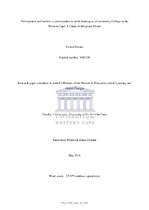| dc.contributor.advisor | Groener, Zelda | |
| dc.contributor.author | Hearne, Vivian | |
| dc.date.accessioned | 2019-02-18T13:32:41Z | |
| dc.date.available | 2019-02-18T13:32:41Z | |
| dc.date.issued | 2018 | |
| dc.identifier.uri | http://hdl.handle.net/11394/6610 | |
| dc.description | Magister Educationis (Adult Learning and Global Change) - MEd(AL) | en_US |
| dc.description.abstract | This study investigates “why adults participate in learning activities” and “what barriers deter adults from participating in learning activities.” Learning activities can include informal learning initiatives and formal education programmes. According to Larson and Milana (2006) “the question of why some people participates in adult education and training while others don’t thus” (p. 2) is as relevant and urgent as ever as we want to make lifelong learning accessible for everybody. While working at a Community College in the Western Cape (South Africa), for the period October 2007 until June 2010, I have observed and noticed that many of the learners who entered the different programmes were all of a certain age. Many of them experienced an excess of barriers deterring them from participation in learning. For the purpose of this study, I am going to use the Chain-of-Response (COR) Model by Cross (1981a) to investigate specifically the situational barriers affecting those learners. Cross (1981a) developed the COR model. The rationale behind it was to better understand what urges people to participate in higher education or learning institutions. This model can be seen as cyclic, and involves seven steps developed by Cross (1981a) which have different impacts on the decision-making process of whether to enter or participate and persist in an adult learning course. Cross (1981a) argues that “an adult’s participation in a learning activity is not an isolated act but is the result of a complex chain of responses based on the evaluation of the position of the individual in their environment” (p. 36). Responses leading to participation tend to originate within the individual, as opposed to outside forces; it can either encourage or discourage participation in learning. | en_US |
| dc.language.iso | en | en_US |
| dc.publisher | University of the Western Cape | en_US |
| dc.subject | Barriers to participation | en_US |
| dc.subject | Adult learning | en_US |
| dc.subject | Learning activities | en_US |
| dc.subject | Situational barriers | en_US |
| dc.subject | Informal learning initiatives | en_US |
| dc.title | Participation and barriers to participation in adult learning at a community college in the Western Cape: A chain-of-response model | en_US |
| dc.rights.holder | University of the Western Cape | en_US |

